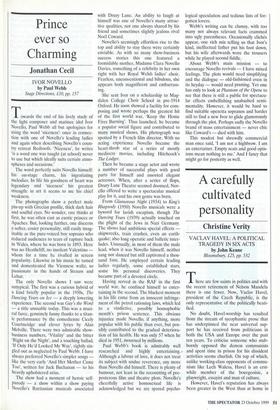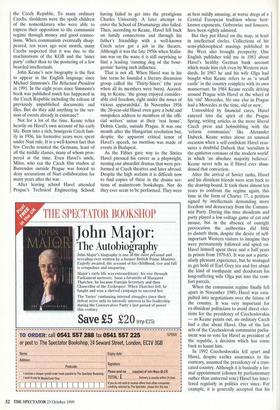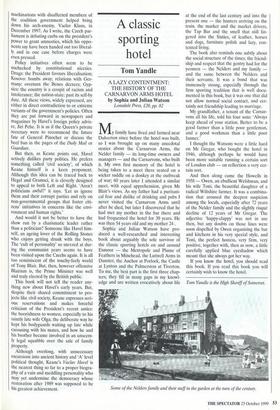A carefully cultivated personality
Christine Verity
VACLAV HAVEL: A POLITICAL TRAGEDY IN SIX ACTS by John Keane Bloomsbury, £25, pp. 532
There are few saints in politics and with the recent retirement of Nelson Mandela there is one fewer. Now, Vaclav Havel, president of the Czech Republic, is the only representative of the politically beati- fied.
No doubt, Havel-worship has resulted from the stream of sycophantic prose that has underpinned the near universal sup- port he has received from politicians in both the USA and Europe over the past ten years. To criticise someone who stub- bornly opposed the demon communists and spent time in prison for his dissident activities seems churlish. On top of which, unlike working-class opponents of commu- nism like Lech Walesa, Havel is an erst- while member of the bourgeoisie, a playwright, essayist and man of culture.
However, Havel's reputation has always been greater in the West than at home in the Czech Republic. To many ordinary Czechs, dissidents were the spoilt children of the nomenklatura who were able to express their opposition to the communist regime through money and good connec- tions. When communism eventually disap- peared, ten years ago next month, many Czechs suspected that it was due to the machinations of the KGB and the 'inner party' rather than to the posturing of a few bearded intellectuals.
John Keane's new biography is the first to appear in the English language since Michael Simmons's The Reluctant President in 1991. In the eight years since Simmons's book was published much has happened in the Czech Republic including the release of previously unpublished documents and files. But do they add anything to the ver- sion of events already in existence?
Not for a lot of the time. Keane relies heavily on Havel's own account of his early life. Born into a rich, bourgeois Czech fam- ily in 1936, his formative years were spent under Nazi rule. It is a well-known fact that few Czechs resisted the Germans, least of all the middle classes, many of whom pros- pered at the time. Even Havel's uncle, Milos, who ran the Czech film studios at Barrendov outside Prague was forced to deny accusations of Nazi collaboration for many years after the war.
After leaving school Havel attended Prague's Technical Engineering School, having failed to get into the prestigious Charles University. A later attempt to enter the School of Dramaturgy also failed. Then, according to Keane, Havel fell back on family connections and through his father's friendship with a well-known Czech actor got a job in the theatre. Although it was the late 1950s when Stalin- ism was on the wane it is still surprising to find a leading 'running dog of the bour- geoisie' having such influence.
That is not all. When Havel was in his late teens he founded a literary discussion group called the 'Thirty-Sixers' (the year when all its members were born). Accord- ing to Keane, 'the group enjoyed consider- able civil freedom, right under the noses of vicious apparatchiks'. In November 1956 the 20-year-old Havel even gave a bold and outspoken address to members of the offi- cial writers' union at their 'rest home', Dobris Castle, outside Prague. It was one month after the Hungarian revolution but, despite the apparent critical tenor of Havel's speech, no mention was made of events in Budapest.
As the Fifties gave way to the Sixties Havel pursued his career as a playwright, turning out absurdist dramas that were per- formed at Czech theatres and later abroad. Despite the high acclaim it is difficult now to find copies of these in the drama sec- tions of mainstream bookshops. Nor do they ever seem to be performed. They were at best mildly amusing, at worse dregs of a Central European tradition whose best- known exponents, Gobrowizc and Ionesco, have been rightly admired.
But they put Havel on the map, at least in intellectual circles. Collections of his semi-philosophical musings published in the West also brought prosperity. One English publisher told me in 1983 about Havel's healthy German bank account which made him rich even by Western stan- dards. In 1967 he and his wife Olga had bought what Keane refers to as 'a small castle' in the country complete with its own manservant. In 1984 Keane recalls driving around Prague with Havel at the wheel of his 'old' Mercedes. No one else in Prague had a Mercedes at the time, old or new.
Untroubled by financial cares, Havel entered into the spirit of the Prague Spring, writing articles in the more liberal Czech press and hobnobbing with the 'reform communists' like Alexander Dubcek. Keane writes about an unusual occasion when a self-confident Havel reas- sures a doubtful Dubcek that 'socialism is the epitheton constans of the modern world' in which 'an absolute majority believes'. Keane never tells us if Havel ever aban- doned that conviction.
After the arrival of Soviet tanks, Havel and his dissident friends were sent back to the drawing-board. It took them almost ten years to confront the regime again, this time in the form of Charter 77, a petition signed by intellectuals demanding more freedom and democracy from the Commu- nist Party. During this time dissidents and party played a low-voltage game of cat and mouse, but in the absence of outright provocation the authorities did little to disturb them, despite the desire of self- important Western visitors to imagine they were .permanently followed and spied on. Havel himself spent three and a half years in prison from 1979-83. It was not a partic- ularly pleasant experience, but he managed to get hold of Earl Grey tea and fret abgut the kind of toothpaste and deodorant-his long-suffering wife Olga put into the com- fort parcels.
When the communist regime finally fell apart in November 1989; Havel was cata- pulted into negotiations over the future of the country. It was very important for ex-dissident politicians to avoid direct elec- tions for the presidency of Czechoslovakia — as Keane points out, no ordinary Czech had a clue about Havel. One of the last acts of the Czechoslovak communist parlia- ment was to vote for Havel as president of the republic, a decision which has come back to haunt him.
In 1992 Czechoslovakia fell apart and Havel, despite earlier assurances to the contrary, assumed the presidency of a trun- cated country. Although it is basically a for- mal appointment (chosen by parliamentary rather than universal vote) Havel has inter- fered regularly in politics ever since. For example, it is generally accepted that his machinations with disaffected members of the coalition government helped bring down his arch-enemy, Vaclav Klaus, in December 1997. As I write, the Czech par- liament is debating curbs on the president's Power to grant amnesties, which his oppo- nents say have been handed out too liberal- ly and in one case before charges were even pressed.
Policy initiatives often seem to be unchecked by constitutional niceties.
Drugs: the President favours liberalisation; Kosovo: bombs away; relations with Ger- many: overturn the Benes decrees; Gyp- sies: the country is a cesspit of racism and intolerance; the nation-state: past its sell-by date. All these views, widely expressed, are either in direct contradiction to or extreme variants of the government's policies. Often they are put forward in newspapers and magazines by Havel's foreign policy advis- er, Jiri Pehe. It is as if the Queen's private secretary were to recommend the future
fate of General Pinochet or discuss the beef ban in the pages of the Daily Mail or Guardian.
But then, as Keane points out, Havel actively dislikes party politics. He prefers something called 'civil society', of which Keane himself is a keen proponent. Although this idea can be traced back to Hegel and Gramsci, it is cleverly designed to appeal to both Left and Right. 'Aren't politicians awful?' it says. 'Let us ignore them and their corrupt parties and rely on non-governmental groups that foster citi- zens' initiatives in concerns like the envi- ronment and human rights.'
And would it not be better to have the show run by a charismatic leader rather than a politician? Someone like Havel him- self, an ageing lover of the Rolling Stones who enjoys getting drunk with the boys.
The 'cult of personality' so sneered at dur- ing the communist years seems to have been visited upon the Czechs again. It is all too reminiscent of the touchy-feely world of Tony Blair. But, then, however offensive Blairism is, the Prime Minister was well and truly elected by the British public.
This book will not tell the reader any- thing new about Havel's early years. But, despite their shared commitment to pro- jects like civil society, Keane expresses seri- ous reservations and makes forceful criticism of the President's recent antics: the boorishness to women, especially to his saintly late wife Olga; the deliberate way he kept his bodyguards waiting up late while carousing with his mates, and how he and his brother became involved in an unseem- ly legal squabble over the sale of family property.
Although overlong, with unnecessary excursions into ancient history and 'A' level
political thought, Keane's Vaclav Havel is
the nearest thing so far to a proper biogra- phy of a vain and meddling personality who may yet undermine the democracy whose restoration after 1989 was supposed to be his greatest achievement.




















































































 Previous page
Previous page